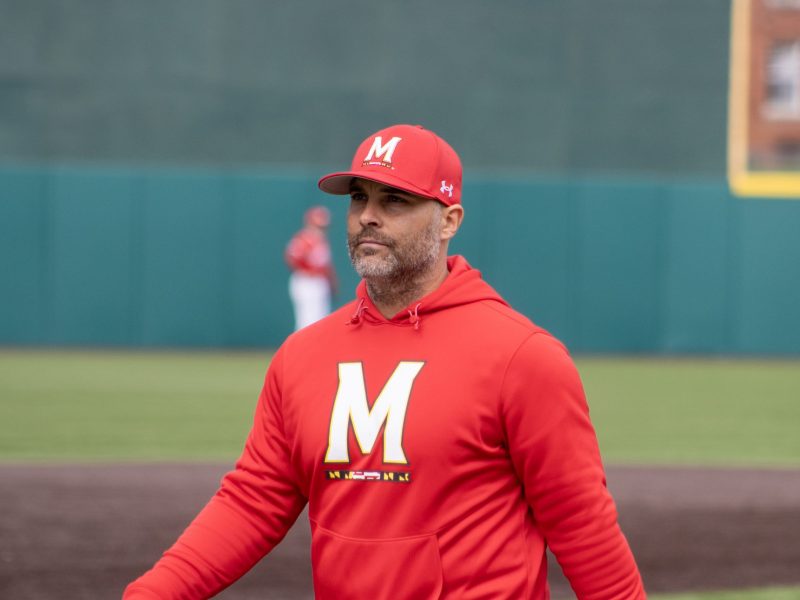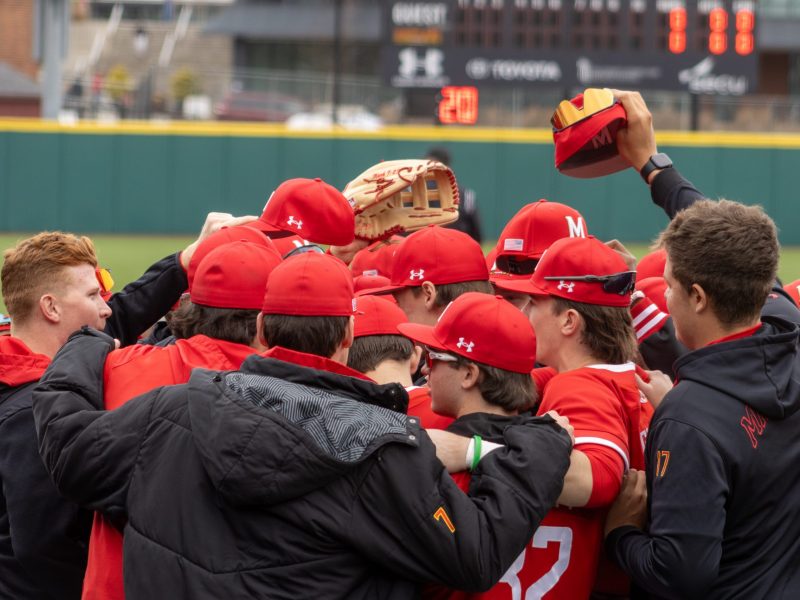As coach Rob Vaughn watched the Maryland baseball team take batting practice ahead of its series finale against Indiana on May 19, he checked his phone for updates on the Michigan State game.
Once the Spartans beat the Buckeyes, 8-3, Vaughn knew his squad only had about four hours left together, and resolved to get all of his seniors into their final college contest.
Already eliminated from Big Ten tournament contention, the Terps lost the season finale, 13-3, to end the year with a series sweep and a disappointing 24-30 overall record. Failing to even make the conference tournament represented a significant letdown for a team that had preseason expectations of reaching an NCAA Regional.
Maryland’s season-ending sweep was a microcosm of a campaign in which a surprisingly quiet offense couldn’t mask an expectedly shaky bullpen. Vaughn, however, believes the struggles endured during his first season as head coach will be valuable down the road.
“That sounds disgusting … right now, but I think the amount that’s learned from this year, as coaches and as players, I think is going to be huge,” Vaughn said. “When you kind of get your teeth kicked in a little bit, you evaluate everything.”
The Terps controlled their own destiny for the Big Ten tournament entering the final weekend. They seemed poised to inch closer to the tournament field in the first game, but four relievers combined to allow a four-run eighth inning to spoil that chance.
Maryland then stranded 12 runners in a loss Friday, a season-long trend the squad bucked during a breakout against Rutgers but reverted to the following weekend against the Hoosiers.
“We came up short of, really, the expectation,” Vaughn said. “I can’t even call that a goal. That’s an expectation, for this program to be playing in the Big Ten tournament.”
After a promising season-opening series win over Tennessee, the Terps stumbled in a Wednesday contest against William & Mary for the first of its eight midweek losses. Last year, Maryland scored at least seven runs six times in midweek games to help overcome unreliable pitching, but it reached that mark just twice in 2018 and had a 5-8 midweek record.
“Last year, we got away with it because we were a little bit hotter offensively,” center fielder Zach Jancarski said March 27. “Really good teams, they find a way to at least get the ball in play.”
Meanwhile, the team’s bullpen frequently lost crucial games. Maryland allowed three late runs to drop its series finale against Illinois, gave up a five-run seventh against Purdue to secure a Boilermakers sweep and blew an 8-1 lead over Nebraska in an eventual series loss.
“There’s three or four games throughout the course of the year that at the time, it’s easy to be like, ‘Oh, that’s just one game,'” Vaughn said. “Well, when you do that four or five times, it adds up and you find yourself going into the end of the year needing to do something special.”
Maryland’s 5.28 ERA, fourth-worst in the conference, confirmed preseason worries of a shaky relief corps. But nobody anticipated its lineup would hit just .243, the second-lowest batting average in the Big Ten and 31 points below last season’s mark.
A late push in May, led by previously underperforming seniors Jancarski and left fielder Will Watson, dragged the Terps to the verge of Big Ten tournament contention, but they were facing too steep of a climb, and beating a superior Indiana team wasn’t in the cards.
“Part of our journey this year has been fighting through adversity,” right fielder Marty Costes said May 15. “It’s a different feeling, definitely.”
After having an upperclassmen-heavy squad in 2018, the Terps’ outlook for next season rides heavily on June’s MLB draft. Maryland is likely to lose as many as six of its starting position players and two starters on the mound.
With Jancarski and Watson graduating and Costes a draft prospect, next year’s lineup may have three new outfielders.
Around the infield, second baseman Nick Dunn, a first-team All-Big Ten selection, should also be drafted, while catcher Justin Morris and first baseman Kevin Biondic are graduating.
Maryland’s No. 23-ranked recruiting class includes two outfielders — Nick Decker and Jack Herman — who may be selected in the draft as well.
The incoming recruiting class includes eight pitchers, according to Perfect Game, and with Taylor Bloom graduating and Hunter Parsons draft eligible following the best season of his career, those arms may be counted on for significant innings next year.
Facing significant losses after a disappointing 2018, the Terps may not immediately return to the successes enjoyed under former head coach John Szefc. Still, Vaughn isn’t worried entering his second year at the helm.
“We’ve still got a good thing going here,” Vaughn said. “We’re going to put our nose down and get to work.”



